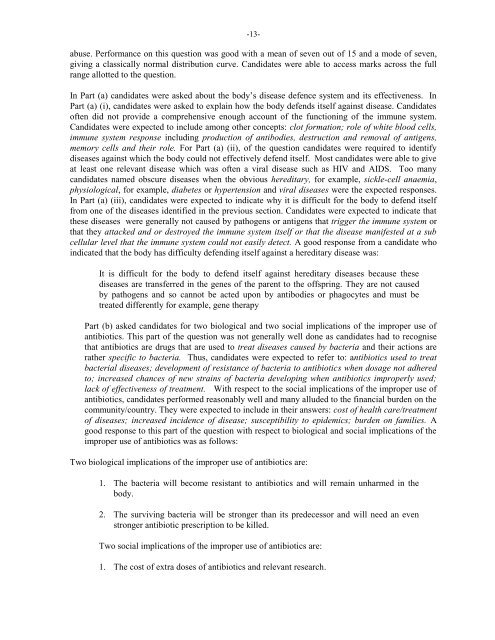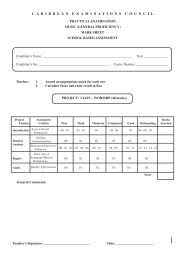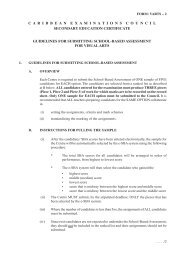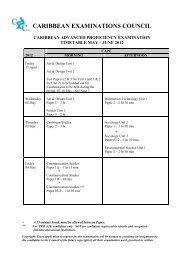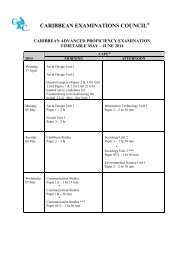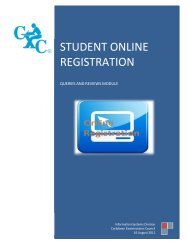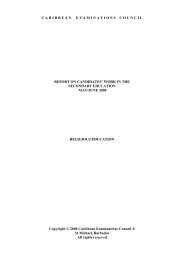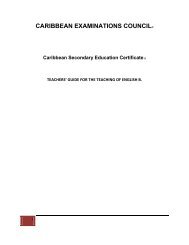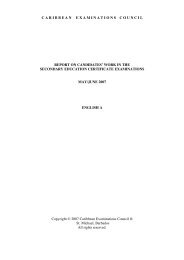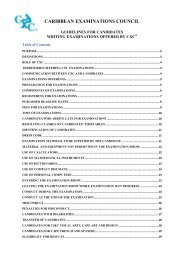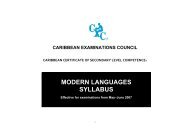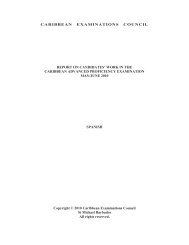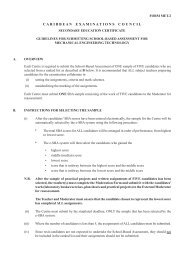Biology - Caribbean Examinations Council
Biology - Caribbean Examinations Council
Biology - Caribbean Examinations Council
Create successful ePaper yourself
Turn your PDF publications into a flip-book with our unique Google optimized e-Paper software.
-13-abuse. Performance on this question was good with a mean of seven out of 15 and a mode of seven,giving a classically normal distribution curve. Candidates were able to access marks across the fullrange allotted to the question.In Part (a) candidates were asked about the body‟s disease defence system and its effectiveness. InPart (a) (i), candidates were asked to explain how the body defends itself against disease. Candidatesoften did not provide a comprehensive enough account of the functioning of the immune system.Candidates were expected to include among other concepts: clot formation; role of white blood cells,immune system response including production of antibodies, destruction and removal of antigens,memory cells and their role. For Part (a) (ii), of the question candidates were required to identifydiseases against which the body could not effectively defend itself. Most candidates were able to giveat least one relevant disease which was often a viral disease such as HIV and AIDS. Too manycandidates named obscure diseases when the obvious hereditary, for example, sickle-cell anaemia,physiological, for example, diabetes or hypertension and viral diseases were the expected responses.In Part (a) (iii), candidates were expected to indicate why it is difficult for the body to defend itselffrom one of the diseases identified in the previous section. Candidates were expected to indicate thatthese diseases were generally not caused by pathogens or antigens that trigger the immune system orthat they attacked and or destroyed the immune system itself or that the disease manifested at a subcellular level that the immune system could not easily detect. A good response from a candidate whoindicated that the body has difficulty defending itself against a hereditary disease was:It is difficult for the body to defend itself against hereditary diseases because thesediseases are transferred in the genes of the parent to the offspring. They are not causedby pathogens and so cannot be acted upon by antibodies or phagocytes and must betreated differently for example, gene therapyPart (b) asked candidates for two biological and two social implications of the improper use ofantibiotics. This part of the question was not generally well done as candidates had to recognisethat antibiotics are drugs that are used to treat diseases caused by bacteria and their actions arerather specific to bacteria. Thus, candidates were expected to refer to: antibiotics used to treatbacterial diseases; development of resistance of bacteria to antibiotics when dosage not adheredto; increased chances of new strains of bacteria developing when antibiotics improperly used;lack of effectiveness of treatment. With respect to the social implications of the improper use ofantibiotics, candidates performed reasonably well and many alluded to the financial burden on thecommunity/country. They were expected to include in their answers: cost of health care/treatmentof diseases; increased incidence of disease; susceptibility to epidemics; burden on families. Agood response to this part of the question with respect to biological and social implications of theimproper use of antibiotics was as follows:Two biological implications of the improper use of antibiotics are:1. The bacteria will become resistant to antibiotics and will remain unharmed in thebody.2. The surviving bacteria will be stronger than its predecessor and will need an evenstronger antibiotic prescription to be killed.Two social implications of the improper use of antibiotics are:1. The cost of extra doses of antibiotics and relevant research.


